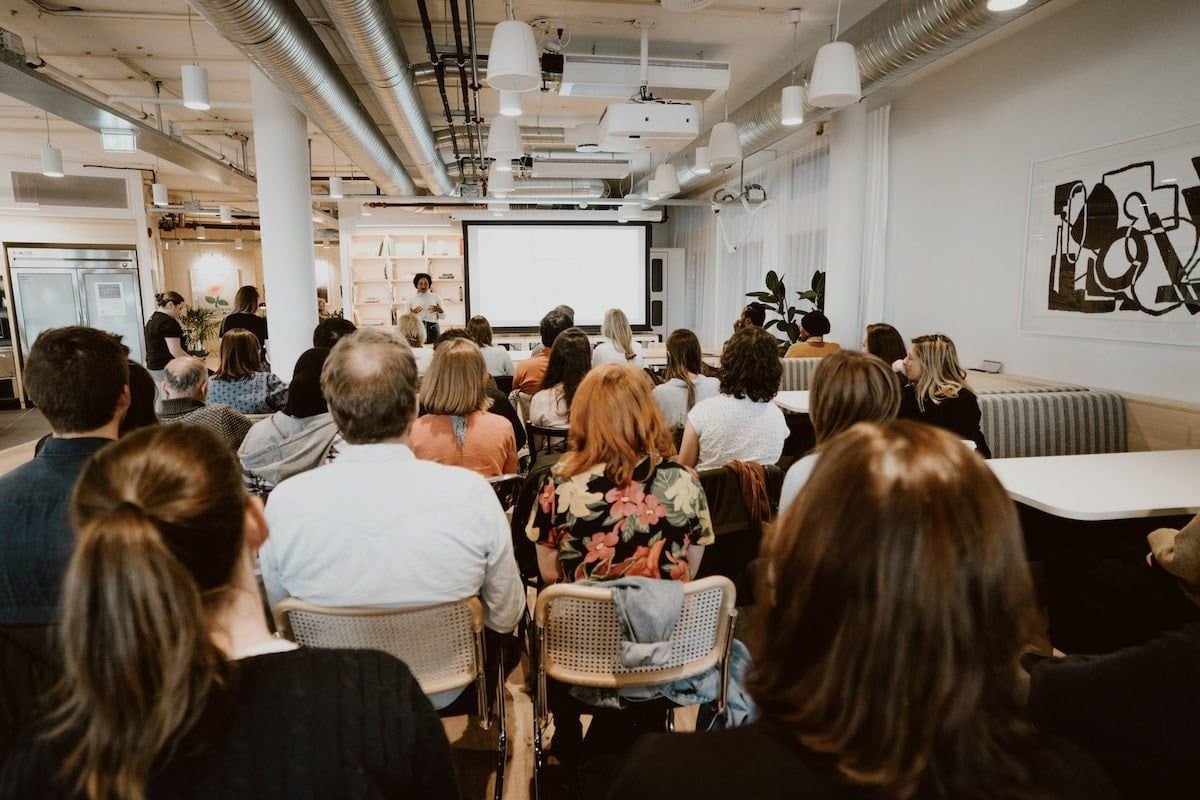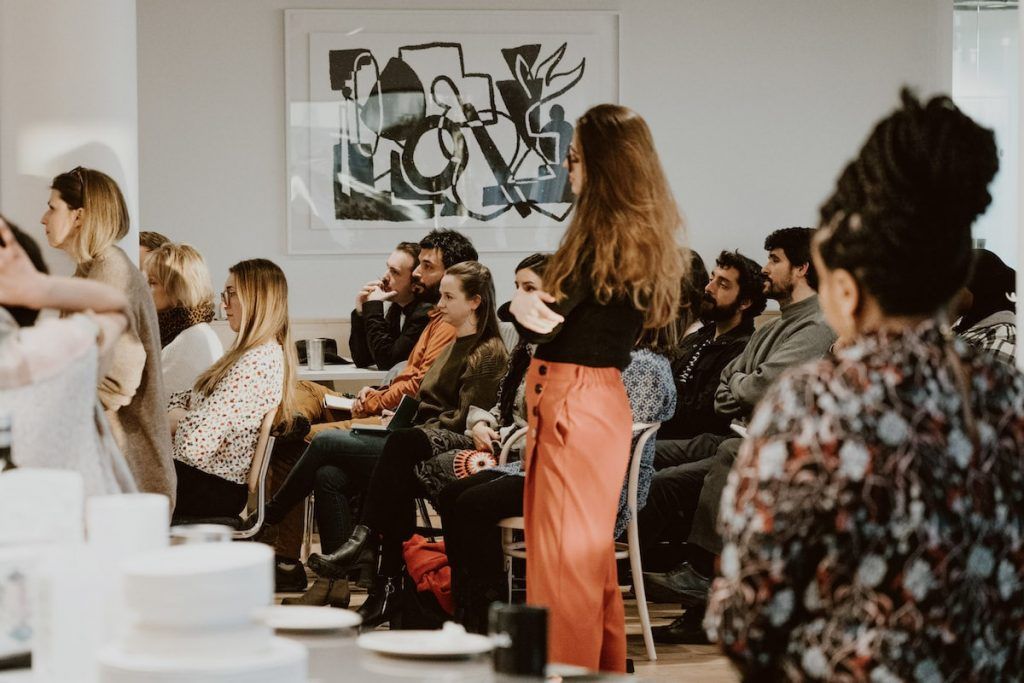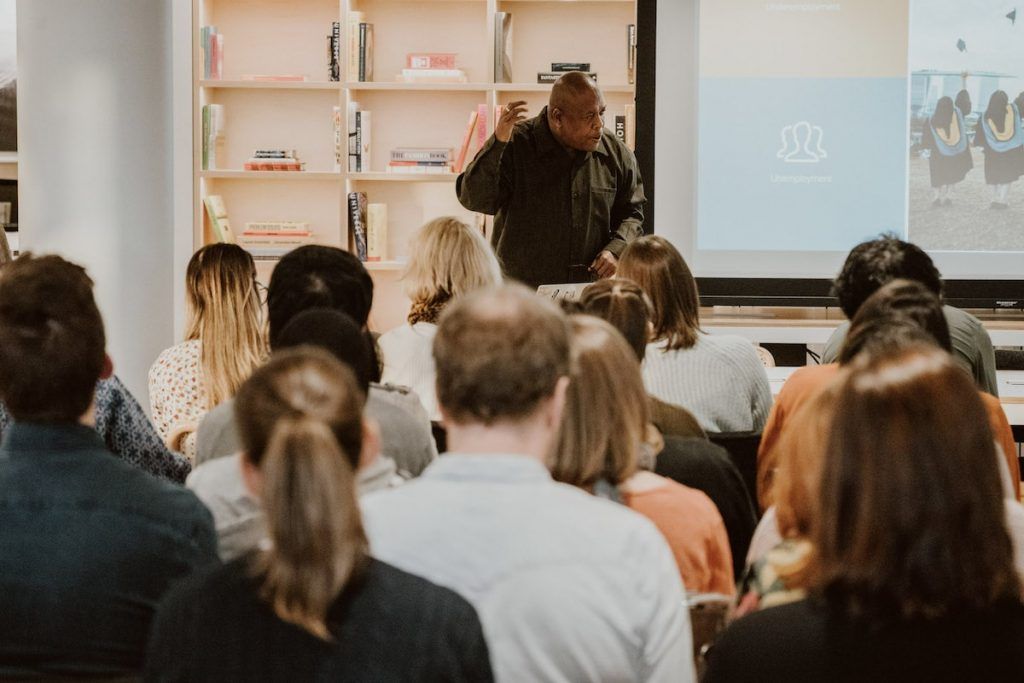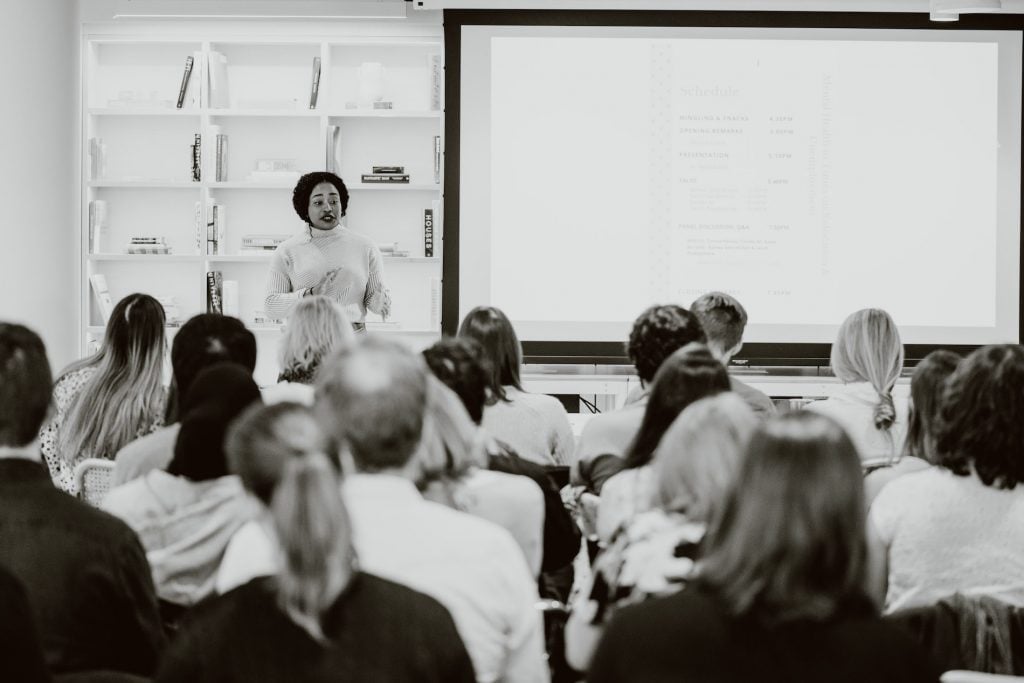On March 5, 2020, we had an event to address the mental health challenges people face when they relocate to a new country. We called it, Mental Health in Times of Relocation and Unemployment. At this session we gathered together a diverse panelist made up of generous minds, who shared openly, vulnerably and pragmatically. Our panelists were Dr. Tyrone Partee (Authentigration); Faraaz Ali (Founder’s Institute Norway), Katie Barstad (WeWork), Rahwa Gebrekidan (Manifold) and Sarah Przedpelska (Catalysts Norway). This session was moderated by Iva Ogrizovic and Chisom Udeze (Diversify).
So, what inspired us to put together an event of this nature? Because we understand the struggle! And know that Norway is not only sunshine and rainbows! We believe we need to speak more about it. When we do not address these challenges, they build up. Each one of us at Diversify and many of our international friends living in Norway (and even some of our Norwegian friends who are repats), have a similar story to tell! Not everyone struggles with unemployment, but most struggle with integrating, finding a social community, or just feeling heard or seen.
If mental health challenges that result from relocation is on a low to high spectrum, then unemployment most certainly drives individual situations to ‘high’. Relocation to any country is hard enough, but to be slapped in the face by the experiences that are echoed in one way, shape or form by many internationals (because initially, we do not know better and are unprepared for the reality of Norway), further exacerbate the burden. So, we need to talk more about the challenges, so as to better manage our expectations and those of others who just moved or are planning to move here. If you expect that for you, Norway might not immediately be the ‘happiest country in the world,’ then you might be better prepared and might not suffer mental health challenges or a depression. If we talk more about it, then Norwegian partners or friends of internationals will understand that we are not just ‘complaining’, and they might be better equipped to empathize with or hear us. As they say, the first step to solving any problem is admitting that it exists.
How does unemployment play a part in mental health challenges? Well, because what we do (or not do) professionally is a significant part of our identity. Sometimes, and unfortunately so, it is a significant part of our self-worth. Therefore, mental health challenges are often compounded by the inability to secure employment – or even secure an interview for a job application.
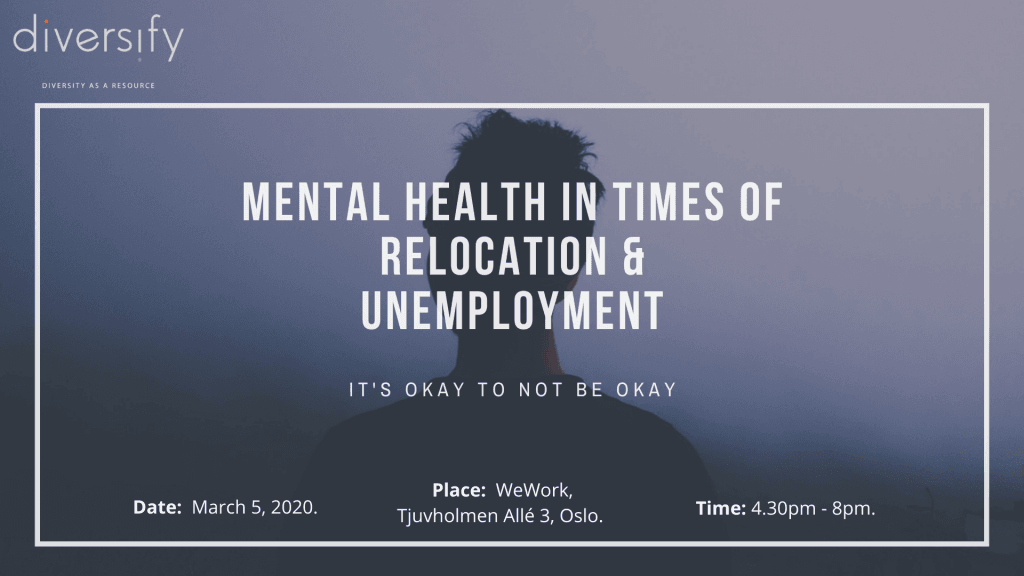
It is often difficult to articulate the challenges people face when they move to a new country, and Norway in particular. The emotional, social or professional trauma that people undergo is real. Yet, for many people we have spoken with, it is difficult to pinpoint the exact moment when the downward spiral begins. Usually, the feeling of depression that people encounter creeps in slowly, like a thief in the night. And because for most people, it is not anticipated, it can be a shock.
We often ask ourselves, why do I feel like this? In the happiest country in the world! Why can’t I find a job in a country with a low unemployment rate? Why can’t I make friends in a country where people are supposedly nice and welcoming? Why am I struggling as much emotionally as I am now? Everyone else seems to have it together. Is it just me? Am I crazy? And if like some of us, you begin to speak up to your Norwegian friends, loved ones and family about this, you feel even crazier. They don’t see what you see. Sometimes, they even ask you why you are so angry – in God’s own country filled with happy and content people! And if you let it, it slowly begins to chip away at your confidence. If you have never dealt with something like this or do not anticipate it, then it can be a rude awakening.
So, we are here to tell you that your anger (aka frustration) is not unfounded. And as Dr. Tyrone puts it, “you are certainly not crazy!”
At this session, we heard from the compassionate panelists who brought a unique angle to the topic by sharing their own stories. What was evident was that each had similar emotional responses to their different situations, and even more importantly, they rose above the challenges they faced. The panelists agreed that depending on where they start your journey (i.e. moved for: a job, love, asylum, new opportunities; or just moving back home), there might be an identity crisis that often comes coupled with a slow but steady loss of confidence and an intensified feeling of isolation. It is no coincidence that men and women who have never met each other have similar experiences across Norwegian cities.
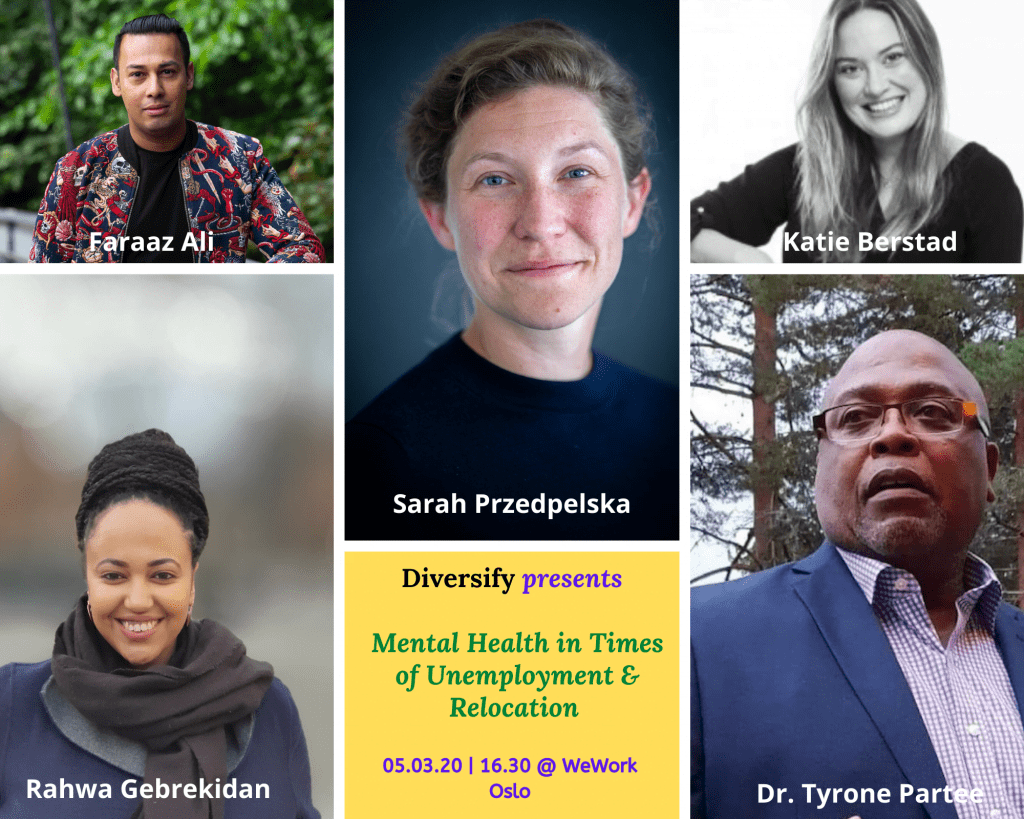
Nonetheless, the central message the panelists put forward was this – “IT GETS BETTER!” It truly does! And we, at Diversify, know this as a Matter. Of. Fact. So, ask yourself, what can I do to improve my current situation and change my new life for the better?
- Find your own tribe who see and hear you. Who make you feel like home. And yes, it is perfectly okay if they are not Norwegian nationals! A friend is a friend. Be they Norwegian, Canadian, Swedish, Spanish, Chinese or Ghanaian. It takes time, but eventually, if it’s important to you, with some effort, you’ll meet your Norwegian tribe!
- You might not get a job in your chosen or preferred profession. You will probably not get the job you are qualified, overqualified or under-qualified for – even after you restructure and revamp your CV, cover letter, and approach to fit Norwegian standards. It’s okay! Many before you have had similar experiences and survived the struggle. Don’t settle. Make a plan – volunteer at an organization, start your own business, build your own non-profit organization and grow your community, and network like it’s going out of style. But be authentic and speak your truth. It’s not an either/or… you can do it all!
- You might experience discrimination across social and professional lines on the basis of race, nationality, religion, personality and perspective. When you bring it up, many will deny it exists. You will need your tribe for the many venting sessions. A bottle of wine and a nice meal does a good venting session justice!
- Talk to your partner or companies (aka your reasons for being in Norway). When things get rough, and you realize that your ‘reason why’ does not ‘see or hear you,’ you might begin to resent them. But be kind. It’s also difficult for them. Especially when upending the brainwash of one of the world’s happiest countries.
- Have your partners meet or hear from other internationals of their experiences. S/he might also become friends with internationals! Way to grow your community, shatter biases and change minds!
- If you are a Norwegian partner reading this, then understand that the struggles your partner is going through are real and valid. Listen to them. Help them in any way you can. Be patient. Don’t give unempathetic advice! Don’t defend your country – we know it’s hard not to. But try not to!
- Most importantly: GET HELP! Seek therapy. There is absolutely no shame in it. Do not allow cultural or social stigma get in the way of your mental health. A man we know said, and we paraphrase, “going to therapy should be like going to the gym. You do not stop when you get to your goal weight, fitness level, or have a six-pack; you continue, so as to maintain it.”
- In lieu of seeking help, you need skilled and culturally competent therapists! An organization in Norway, Generation Mobility is providing exactly this type of resource and has access to a variety of therapists. Generation Mobility is launching an online counselling and coaching platform. Their counsellors and coaches are called “thrive abroad experts.” These experts are licensed and certified and have lived outside their home countries – so they have perspective! They also have expertise in providing counseling and coaching for the common struggles of living abroad and how it affects us and those around us. It is my understanding that they also offer in-person sessions on a need basis.
- Alternatively, there are also other therapists in Norway who are skilled and can provide the help and guidance you need. You can ask for references from your GP or others in your extended social circles. Finding the right therapist match might be a hit or miss – as Rahwa Gebrekidan mentioned during the event. It might take time, but it is not impossible.
- It is always okay to say that “it sucks!” Vent. Complain all you want! It’s healing and much better than keeping it all in. It sucks! But don’t get stuck. Find a way out of the rot. Do something, anything (see all the above points – these are just some ideas, and not a comprehensive list), but keep it legal :-)!
The fact is that there are many people who struggle. If we continue to deny their challenges and minimize their realities, then we stand a risk of exacerbating their mental health. By acknowledging them, we reduce their suffering. For the most part, people need to be heard. They also need to be seen. And sometimes, it’s also okay to listen, without offering advice or providing a solution. Remember that kindness and empathy does not cost a thing.
Keep in mind that people who face social, emotional or professional challenges vent or want to talk because they seek an improvement in their lives. When they cannot connect, they feel isolated. We highly doubt that people wake up and say, “you know what, I want to be depressed or unsuccessful in my endeavors for the next year.” So, when in doubt, be kind.
The reality is this: Norway is a beautiful country with enviable social amenities. It can be difficult for internationals to integrate socially, professionally or feel welcome in Norway. Norway has nice people. Norway has some unpleasant people. Even in the thick of winter, if you are adventurous, there are lots to do (hello skiing and hiking!). The Norwegian summer is gorgeous and unmatched – you will meet many more smiling Norwegians! Norway is not the happiest country in the world. If you are successful in finding your own tribe, you will easily make some of the best friends in your life here (and yes, finding your own tribe often means asking people you might like to coffee and if you check that they are ‘cool’, asking them to be your friends! There should be no ego or pride in it!). Norway is, by a landslide, not nearly one of the worst countries in the world. And these are all okay.
So, what are we saying? To recap, we need to talk more about challenges: mental health, professional, social, and otherwise; that arises from relocating to Norway, and normalise it.

We thank each speaker for their participation in this event. They left us with many foods for thought.
Dr. Tyrone: You are not crazy!
Faraaz: Positive perspective change is crucial to your mental wellbeing.
Katie: You never step into the same river twice. Try and try again!
Rahwa: It is okay to ask for help.
Sarah: Lead by example and speak your truth! You can be a mentor for others.
We are thankful to the attendees, who came with open hearts and minds, and some even shared their stories with us. We look forward to seeing you all soon again. So, we end this by echoing all the speakers, wherever you find yourself in this journey, please remember that “IT GETS BETTER.”
